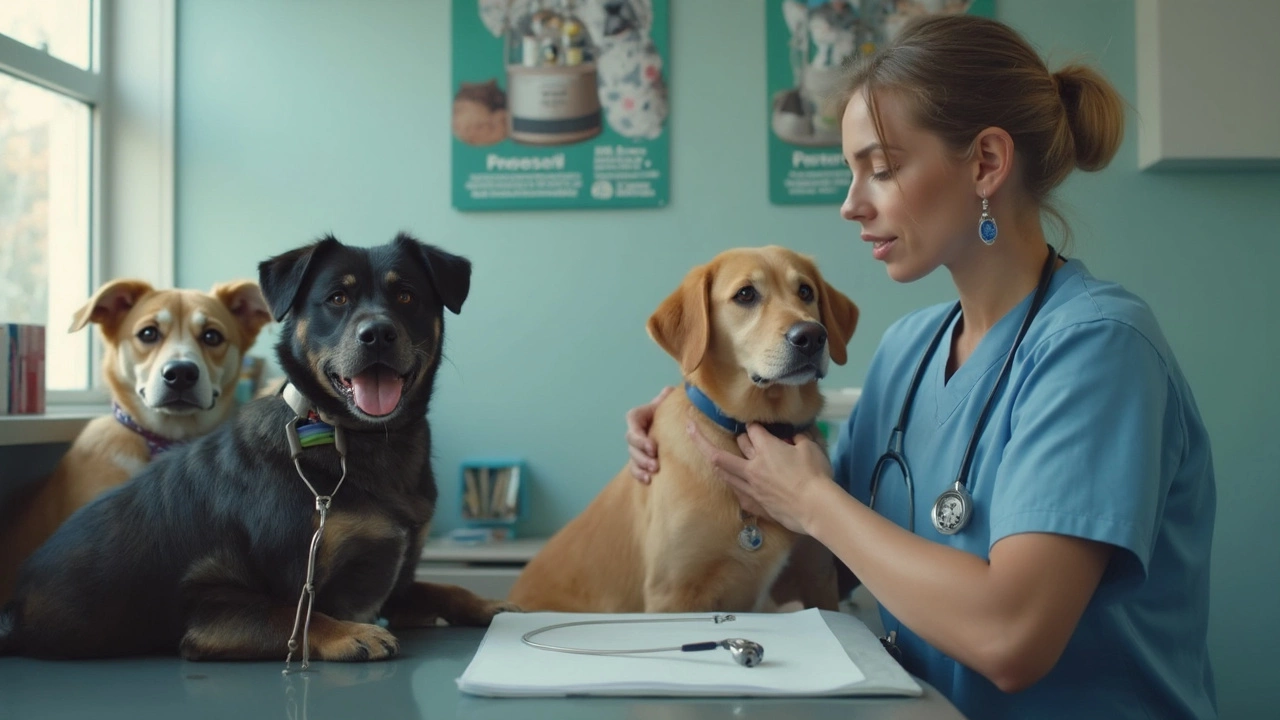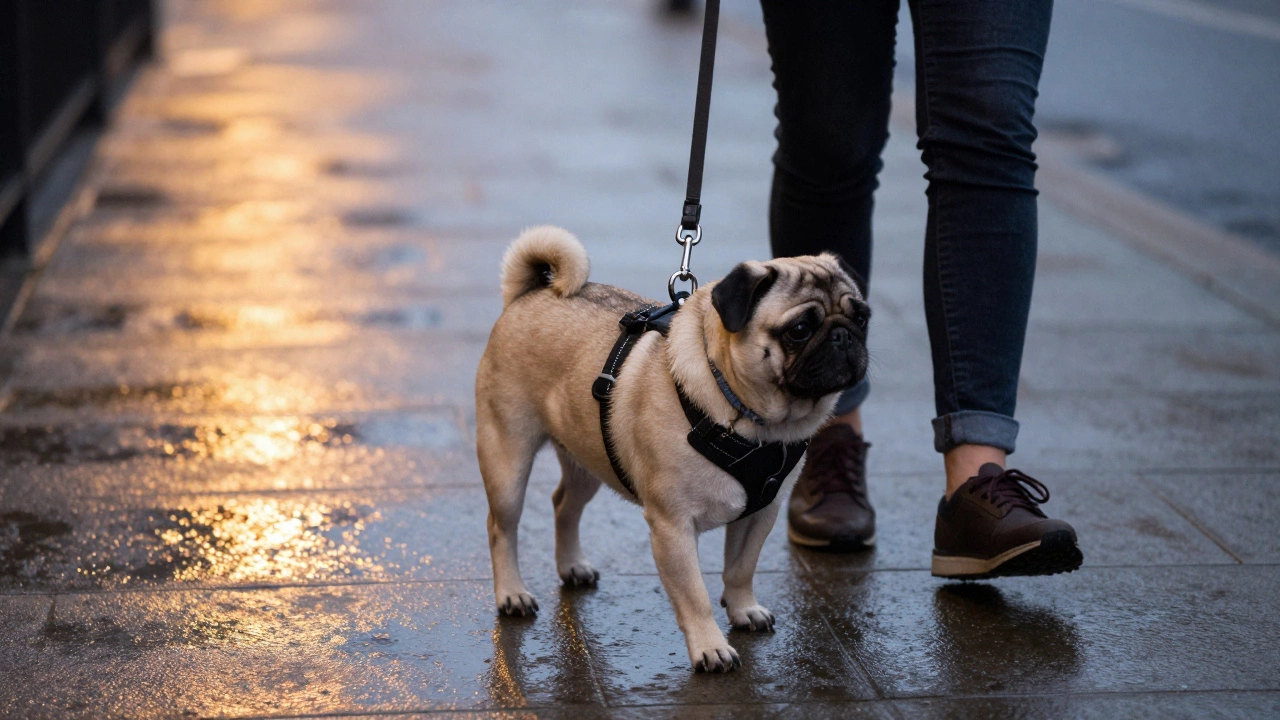Ever found yourself halfway to bed, only to stop and wonder if your dog's collar should come off too? You're not alone—this question trips up tons of dog owners every night. Some folks swear their dogs sleep better when they’re collar-free, while others wouldn’t dream of turning the collar loose, mostly because of ID and safety concerns.
But here’s the kicker: sleeping with a collar isn’t harmless for every dog. Collars can press into the skin, snag on crates or furniture, or just bug a dog that likes to stretch out and roll during the night. Even the jingle of tags can wake up a light sleeper—both human and canine.
If your dog’s got sensitive skin or tends to scratch, leaving the collar on all night could mean irritation or even little bald spots under the band. Plus, most experts agree that a collar-free neck gets a chance to breathe. Not a bad deal, right?
- Collar On or Off at Night: What’s Common?
- The Risks You Might Not Have Considered
- Benefits of Taking the Collar Off Before Bed
- How to Keep Your Dog Safe and Comfy Overnight
Collar On or Off at Night: What’s Common?
So, what are most dog owners actually doing with nighttime dog collars? It’s a real mix. If you asked five people at your local dog park, you’d probably get five different answers. Some owners keep collars on for quick trips outside in the middle of the night or out of fear their dog will slip out the door. Others pop them off once it’s bedtime, figuring there’s no need for extra hardware when everyone’s tucked in.
Let’s break it down. A recent survey from the American Pet Products Association showed about 61% of dog owners keep some sort of collar or ID tag on 24/7, partly to make sure their pet’s safety information is always handy. But there’s a twist—many vets actually suggest taking the collar off, especially when dogs are sleeping at home where they’re already secure.
It’s also pretty common for people who crate their dogs or have pups that sprawl out on furniture to take collars off so nothing gets caught. On the flip side, if you’ve got a backyard escape artist or a dog that’s made a break for it before, keeping that dog collar on might give you peace of mind.
Here’s a quick look at the pros and cons people weigh:
- Keeping the collar on: Easy access to tags, quick to leash for potty breaks, helps if the dog dashes out unexpectedly.
- Collar off at night: More comfort, less risk of irritation or accidents, no jangling tags waking the whole house.
There isn’t a single right answer, but most people work out what’s best based on their dog’s habits and their own comfort level. When it comes to night safety and comfort, a lot of owners make this a case-by-case decision.
The Risks You Might Not Have Considered
Most of us buy a dog collar and slap it on without thinking twice. But keeping it on overnight can actually cause some problems, especially if you’ve got a curious pup or one who really loves to dig and roll around.
First up is the risk of choking or snagging. Dogs can get their collars caught on crate bars, loose floorboards, or even a bed frame. If they panic and pull, the collar can tighten, and that’s a scary situation no one wants to wake up to. Vets sometimes call this 'collar strangulation,' and it happens more than you'd think. The American Veterinary Medical Association has reported real cases where collars led to injuries or worse while a dog’s owner slept through the night.
Then there’s skin trouble. Leaving a collar on 24/7 can rub fur off, cause bald spots, or lead to little raw patches—especially if moisture or dirt gets trapped underneath. If your dog’s got allergies or sensitive skin, these problems pop up even faster. Add to that, collars that are too tight can slowly dig deeper, causing pressure sores or restriction, especially for dogs still growing or putting on weight.
Let’s not forget noise. Jangling tags might seem like no big deal, but for a sensitive or anxious dog, the noise can wreck a good night’s sleep. And if your dog’s restless at night, all that movement plus tags jingling equals a tired dog and a tired you.
| Risk | Potential Outcome |
|---|---|
| Snagging/Choking | Neck injury, panic, or worst case, suffocation |
| Skin Irritation | Bald patches, hot spots, infections |
| Noise | Poor sleep for pets and people |
One more thing: if your dog sleeps with other pets, collars can lead to rough play disasters—mouths or paws get caught, which can cause injury fast.
Bottom line? Leaving a dog collar on overnight isn’t exactly risk-free. Safety and dog health matter just as much at night as during the day.

Benefits of Taking the Collar Off Before Bed
There’s a lot to gain for your dog if you make taking off their dog collar part of the nighttime routine. It’s not just about comfort—removing the collar can help dodge a bunch of little problems that quietly add up over time.
First off, skin health. When a collar stays on 24/7, moisture, sweat, and dirt collect underneath. That’s ground zero for rashes, dry patches, and hair loss, especially in super active dogs or ones with thick coats. Letting your dog's neck air out at night gives the skin a break from that constant pressure and friction.
Next, think about safety. Collars sometimes get caught on crate wires, bed frames, or even another dog’s mouth if you’ve got more than one. While true emergencies are rare, vets do see injuries from collars snagging on random stuff while pups roll around. A collar-free night means zero chance of getting stuck or choked while your dog dreams about chasing squirrels.
Sleep quality matters, too. The jangling of ID tags or a rubby collar isn’t exactly soothing. Sensitive dogs may fidget or scratch, cutting into their deep sleep, which is key for happy moods and healthy immune systems. Stats from a 2023 vet survey showed that over half of dog owners who took collars off at night reported their pets seemed more relaxed and less itchy by morning.
| Potential Issue | Chance with Collar On | Chance with Collar Off |
|---|---|---|
| Skin irritation | High | Very Low |
| Snagging Risk | Possible | Zero |
| Sleep interruptions | Common | Rare |
You’ll also get the bonus of longer-lasting collars. Removing it every night cuts down on the hours of wear and tear, so you don’t have to deal with cracked leather or fraying nylon as often.
All things considered, giving your dog a break from their collar each night stacks up a bunch of small wins that add up to bigger comfort, better health, and less risk. Not bad for a habit that takes five seconds to start.
How to Keep Your Dog Safe and Comfy Overnight
If you're thinking about taking off your dog's collar at night, you still want to make sure your pup is both comfy and secure. Let's get into some ways to balance dog health, night safety, and their overall well-being when bedtime rolls around.
First off, double-check that your dog's microchip registration is up-to-date with the correct info. This isn't just a backup—it's peace of mind if your dog ever sneaks out with the collar off. According to a study from the American Veterinary Medical Association, dogs with microchips have a 52% higher chance of being reunited with their owners than those without.
Set up your sleeping space so it's safe. Inspect your dog's bed area for sharp corners, loose cords, or anything that could catch a collar if you decide to leave it on. If you use crates, make sure there aren't any gaps or wires where collars and tags could get stuck.
- If your dog loves scratching or has sensitive skin, remove their collar before bed. This helps cut down on skin irritation and those weird bald patches collars can cause.
- If you leave the collar on at night for pet comfort or because you worry about them darting out, get a breakaway collar. These are designed to pop open if snagged but still hold tags for easy ID.
- Use flat, lightweight collars. Bulky collars or heavy tags aren’t comfy for a good night’s sleep.
- Keep the collar clean. Dirty collars can harbor bacteria that cause itching or infections, so toss them in the wash or wipe them down regularly.
- Try tag silencers if the nighttime jingling drives you (or your dog) nuts. Rubber covers or silicone tag holders can muffle the sound without hiding vital info.
If you're curious how other dog owners handle this, check out the data below.
| What Owners Do | Percent (%) |
|---|---|
| Take Collar Off Overnight | 46 |
| Leave Collar On Overnight | 54 |
No single answer works for every dog. Tune into your dog's habits, the layout of your home, and how you feel about the balance of collar risks versus pet comfort. Figure out what routine works for you both. That way, both you and your dog can rest easy at night—literally.




